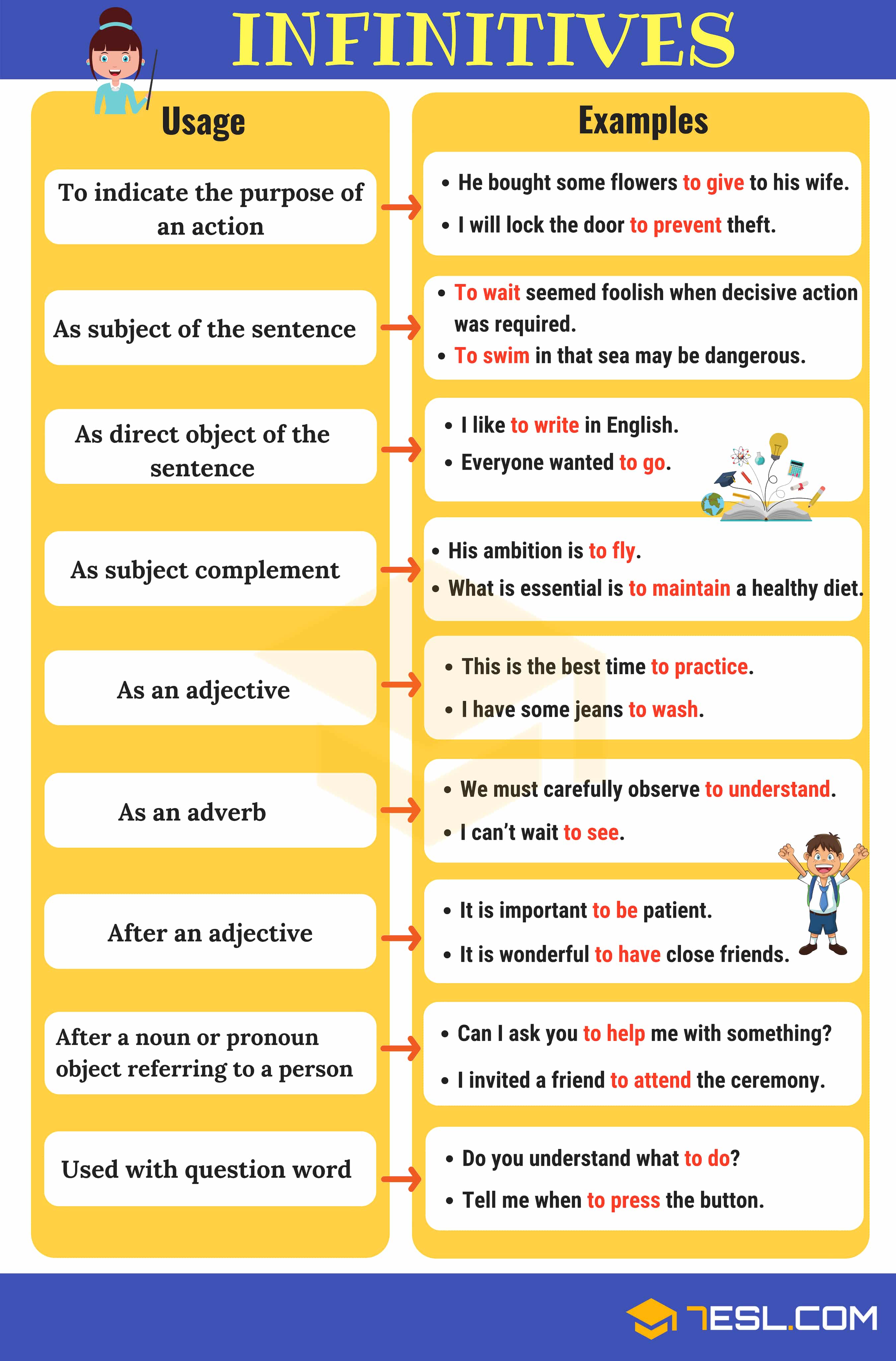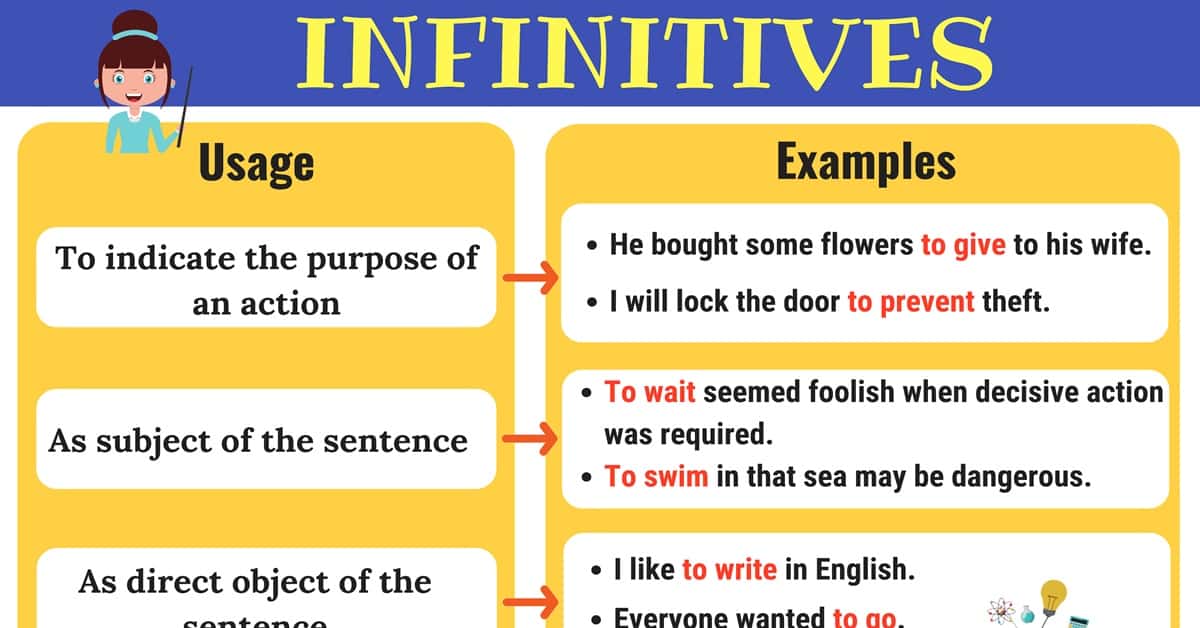Infinitives! What is an infinitive? Learn infinitive definition and when to use infinitives in English with useful grammar rules, video, example sentences, and ESL worksheet.
What Is An Infinitive?
What is an infinitive? An infinitive is a verbal consisting of to + a verb, and it acts like a subject, direct object, subject complement, adjective, or adverb in a sentence. Infinitives are easy to identify because they’re written with to + a verb.
Infinitive examples:
- To give
- To run
- To wait
Although an infinitive is easy to locate because of the to + verb form, deciding what function it has in a sentence can sometimes be confusing.
Keep in mind that though infinitives are verbs, they function differently from verbs, and instead, they act as a noun, adjective, or adverb.
Here are examples:
- I desire to study alone.
Here the verb is “desire” and “to study” is the infinitive.
“To study” is the direct object of “desire” since it’s the receiver of the action of the verb.
Here the infinitive functions as a noun.
- We can only extend our conversation if we have something in common to share.
It tells more information about the noun “conversation.”
Here conversation can only be extended if there is something common to share.
Here the infinitive “to share” functions as an adjective.
- John left school early to join her mum’s birthday celebrations.
“To join” is the infinitive phrase.
The infinitive phrase describes more information as to why John left school early.
In other words, it modifies “left,” which is the verb.
In this sentence, the infinitive acts as an adverb.
Infinitives as Nouns
Keep in mind that a noun can be a person, place, or thing. When used as a subject or direct object in a sentence, an infinitive phrase acts as a noun. In such a case, the subject assumes the role of a verb, whereas the direct object is the receiver of the action of a verb.
Example:
- I like to watch movies alone.
Here “like” is the verb.
“To watch” is the infinitive as it receives the action of the verb (to be liked).
“To watch” acts as a direct object of the sentence.
Here, the infinitive acts as a noun that expresses a thought.
- To join hands with others is necessary.
In this sentence, “is” is the verb and “to join” is the infinitive as it answers the question about what is so necessary?
Here the infinitive phrase “to join” is the subject of the sentence.
This is an indication that the infinitive acts as a noun in this example.
Infinitives as Adjectives
An adjective is a word that describes more information about a noun. An infinitive act as an adjective if it modifies or describes a noun in a sentence.
Example:
- Joyce needs a table to read on.
Here “needs” is the verb, and “table” is the subject (noun).
“To read” is the infinitive, and it acts as an adjective.
Infinitives as Adverbs
An adverb is a word that modifies or describes an adjective, verb, or an adverb. It provides additional information regarding an adjective, verb, or adverb. At times, adverbs can answer the question “why.”
Here is an example:
- The mourners were surprised to hear that the deceased had resurrected.
Here “to hear” is the infinitive. It gives additional information about the adjective “surprised.”
When to Use Infinitives?
We use the infinitive:
To Indicate the Purpose of an Action
Infinitive examples:
- He bought some flowers to give to his wife.
- I will lock the door to prevent theft.
As the Subject of the Sentence
Examples:
- To wait seemed foolish when decisive action was required.
- To swim in that sea may be dangerous.
As the Direct Object of the Sentence
Infinitive examples:
- I like to write in English.
- Everyone wanted to go.
As Subject Complement
Examples:
- His ambition is to fly.
- What is essential is to maintain a healthy diet.
As an Adjective
Infinitive verb examples:
- This is the best time to practice.
- I have some jeans to wash.
As an Adverb
Examples:
- We must carefully observe to understand.
- I can’t wait to see.
After an Adjective
Subject + to be + adjective + (for/of someone) + to-infinitive + (rest of sentence)
Examples:
- It is important to be patient.
- It is wonderful to have close friends.
After an Object that Is a Noun or Pronoun Referring to a Person
Infinitive examples:
- Can I ask you to help me with something?
- I invited a friend to attend the ceremony.
Used with the Question Word
Examples:
- Do you understand what to do?
- Tell me when to press the button.
How to Use Infinitives with Examples | Picture

Infinitive Verb List
Learn a useful list of Verbs Followed by Infinitives in English with examples.
Get
Hesitate
I hesitate to spend so much money on clothes.
Hope
I hope to see you again soon.
Hurry
We’ll have to hurry to catch the last train.
Intend
I heard they intend to marry.
Learn
Children learn to creep ere they can go.
Like
Ancient people like to have a declaration before war.
Love
Men love to hear well of themselves.
Manage
Did you manage to catch the post?
Mean
I didn’t mean to hurt your feelings.
Neglect
Don’t neglect to lock the door when you leave.
Need
You need to change your eating habits.
Offer
She offered to help me move my things to my new house.
Plan
Next year I plan to travel around the world.
Prefer
Would you prefer to live in the country instead of a town?
Prepare
The doctor prepared to prescribe a receipt.
Pretend
She was pretending to cry. I knew she was lying.
Proceed
They will proceed to build another laboratory building.
Promise
He promised to collect her from the airport.
Propose
We propose to deal with this subject in the following chapter.
Refuse
She refused to answer questions about her personal finances.
Remember
He had remembered to bring a pair of gloves, unlike me.
Seem
I always seem to be unlucky at cards.
Start
The child started to sob when he couldn’t find his mother.
Stop
I’m working in the garden and I stop to smoke.
Struggle
He struggled to keep his footing on the slippery floor.
Swear
Do you swear to tell the whole truth?
Threaten
They threatened to ban the book.
Try
We tried to confuse the enemy.
Volunteer
They volunteer to teach introductory courses.
Wait
I can’t wait to see you.
Want
I want to watch TV.
The Bare Infinitives
The zero (bare) infinitive is a type of complement with an infinitive verb form that’s not preceded by the particle to. Also known as the bare infinitive.










0 Comments